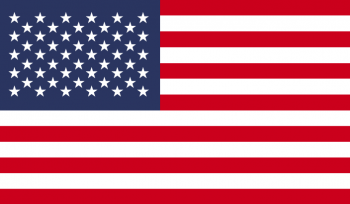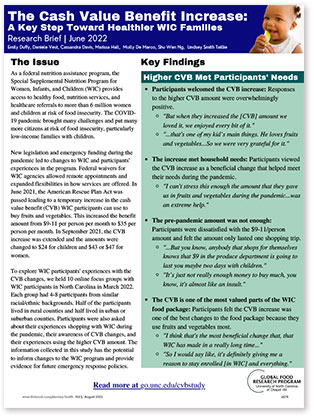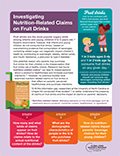
Members of our team have worked for decades on a wide array of nutrition research projects in the United States. Our current work focuses primarily on diet-related health disparities that can lead to higher risk of chronic diseases for some groups, including low-income, Black, and Latinx populations. We also study factors impacting child nutrition. More specifically, our U.S. research projects examine:
 We have developed innovative methods and models to evaluate and inform the design of federal food assistance programs (e.g., WIC, SNAP) and nutrition policy interventions such as front-of-package labeling, food and drink taxes or subsidies, restrictions on junk food marketing, and other nutrition-related policies. These methods include pricing simulations that model the effect of different pricing policies such as taxes and subsidies on food purchases and nutritional outcomes and experimental grocery stores (both virtual and real-life). Read more about our mock stores here:
We have developed innovative methods and models to evaluate and inform the design of federal food assistance programs (e.g., WIC, SNAP) and nutrition policy interventions such as front-of-package labeling, food and drink taxes or subsidies, restrictions on junk food marketing, and other nutrition-related policies. These methods include pricing simulations that model the effect of different pricing policies such as taxes and subsidies on food purchases and nutritional outcomes and experimental grocery stores (both virtual and real-life). Read more about our mock stores here:
Resources
-
A prescription for healthier diets: SuperSNAP in NC
 Policy brief describing SuperSNAP, a Food is Medicine program in NC. Starting in September 2019, the SuperSNAP program enrolled individuals with diet-related health conditions receiving Supplemental Nutrition Assistance Program (SNAP) benefits in nine federally qualified health centers across North Carolina. SuperSNAP participants received $40 per month to spend on fresh, frozen, canned, or dried fruits and vegetables without additives at a participating NC-based chain retailer with around 500 stores across North Carolina. This policy brief includes reflections from surveys with consumers, NC retailers, and healthcare providers on the success of the SuperSNAP program.
Policy brief describing SuperSNAP, a Food is Medicine program in NC. Starting in September 2019, the SuperSNAP program enrolled individuals with diet-related health conditions receiving Supplemental Nutrition Assistance Program (SNAP) benefits in nine federally qualified health centers across North Carolina. SuperSNAP participants received $40 per month to spend on fresh, frozen, canned, or dried fruits and vegetables without additives at a participating NC-based chain retailer with around 500 stores across North Carolina. This policy brief includes reflections from surveys with consumers, NC retailers, and healthcare providers on the success of the SuperSNAP program. -
Comments for USDA Revised WIC Food Package
 The Global Food Research Program's comments submitted in response to the USDA Food and Nutrition Service's proposed updates to foods provided through the Special Supplemental Nutrition Program for Women, Infants, and Children (WIC).
The Global Food Research Program's comments submitted in response to the USDA Food and Nutrition Service's proposed updates to foods provided through the Special Supplemental Nutrition Program for Women, Infants, and Children (WIC). -
WIC cash value benefit increase: A key step toward healthier families
 Policy brief summarizing findings from a study about WIC participants' experiences with changes to the program's cash value benefit for buying fruits and vegetables during the COVID-19 pandemic. Researchers sought to understand WIC participant perceptions of this change and barriers and facilitators to using the CVB.
Policy brief summarizing findings from a study about WIC participants' experiences with changes to the program's cash value benefit for buying fruits and vegetables during the COVID-19 pandemic. Researchers sought to understand WIC participant perceptions of this change and barriers and facilitators to using the CVB. -
Nutrition-related claims on fruit drinks
 Fruit drinks (fruit-flavored beverages that contain added sweeteners) are the most popular sugar drink among infants and young children, despite expert recommendations that this age group should not consume any drinks with added sugar. This Fact sheet summarizes findings from three studies that examined nutrition claims made on fruit drink packages and how claims impact parents’ decisions.
Fruit drinks (fruit-flavored beverages that contain added sweeteners) are the most popular sugar drink among infants and young children, despite expert recommendations that this age group should not consume any drinks with added sugar. This Fact sheet summarizes findings from three studies that examined nutrition claims made on fruit drink packages and how claims impact parents’ decisions.
Publications
-
Understanding Whether Price Tag Messaging Can Amplify the Benefits of Taxes: An Online Experiment.
Authors: Marissa Hall, Phoebe Ruggles, Katherine McNeel, Carmen Prestemon, Cristina Lee, Caitlin Lowery, Aline D'Angelo Campos, Lindsey Smith Taillie
Published In: American Journal Of Preventative Medicine. January 7, 2024 view full text -
Trends in sugar from package foods and beverages purchased by U.S. households between 2002 and 2020.
Authors: Gabriela Vatavuk-Serrati, Sarah M Frank, Shu Wen Ng, Lindsey Smith Taillie
Published In: Journal of the Academy of Nutrition and Dietetics. October 25, 2023 view full text -
Impact of taxes and warning labels on red meat purchases in a naturalistic online grocery store: A randomized controlled trial
Authors: Lindsey Smith Taillie, Maxime Bercholz, Carmen Prestemon, Isabella Higgins, Anna H. Grummon, Marissa G. Hall, Lindsay Jaacks
Published in: PLOS Medicine, September 18, 2023
view full text -
Natural claims on sugary fruit drinks: a randomized experiment with US parents
Authors: Marissa Hall, Ana Paula Richter, Phoebe Ruggles, Cristina Lee, Allison Lazard, Anna Grummon, Isabella Higgins, Emily Duffy, Lindsey Smith Taillie
Published in: American Journal of Preventive Medicine, July 18, 2023 view full text -
How pictorial warnings change parents’ purchases of sugar-sweetened beverage for their children: mechanisms of impact
Authors: Marissa Hall, Anna Grummon, Alison Lazard, T. Queen, Isabella Higgins, A. P. Richter, Lindsey Smith Taillie
Published in: International Journal of Behavioral Nutrition and Physical Activity, June 23, 2023 view full text -
Effects of pictorial warnings on parents' purchases and perceptions of sugar-sweetened beverage categories
Authors: Aline D'Angelo Campos, Lindsey Smith Taillie, Gabriela Vatavuk-Serrati, Anna H. Grummon, Isabella C. A. Higgins, Marissa G. Hall
Published in: Pediatric Obesity, March 25, 2023 view full text -
Food additives in ultra-processed packaged foods: An examination of US household grocery store purchases
Authors: Elizabeth K. Dunford, Donna R. Miles, Barry Popkin
Published in: Journal of the Academy of Nutrition and Dietetics, January 31, 2023 view full text -
Grocery purchase changes were associated with a North Carolina COVID food assistance incentive program
Authors: Caitlin M. Lowery, Richard Henderson, Neal Curran, Sam Hoeffler, Molly DeMarco, Shu Wen Ng
Published in: Health Affairs, November 7, 2022 view full text -
Prevalence and demographic correlates of online grocery shopping: results from a nationally representative survey during the COVID-19 pandemic
Authors: Emily W. Duffy, Amy Lo, Marissa G. Hall, Lindsey Smith Taillie, Shu Wen Ng
Published in: Public Health Nutrition, August 19, 2022 view full text -
Did A Fruit and Vegetable Incentive Program Support low-income Households in North Carolina during the COVID-19 Pandemic? A Mixed Methods Assessment of the Healthy Helping Program and Other Pandemic-Related Food Assistance
Authors: Isabel Lu, Brett Sheppard, Shu Wen Ng, Sarah Burstein, Emile Charles, Taylor Williams
and Molly De Marco
Published in: Journal of Hunger & Environmental Nutrition, August 7, 2022 view full text -
"I think that's the most beneficial change that the WIC has made in a really long time": Perceptions and awareness of an increase in the WIC Cash Value Benefit
Authors: Emily W. Duffy, Daniele A. Vest, Cassandra R. Davis, Marissa G. Hall, Molly De Marco, Shu Wen Ng, Lindsey Smith Taillie
Published in: International Journal of Environmental Research and Public Health, July 16, 2022 view full text -
Do sugar warning labels influence parents' selection of a labeled snack for their children? A randomized trial in a virtual convenience store
Authors: Lindsey Smith Taillie, Isabella C. A. Higgins, Allison J. Lazard, Donna R. Miles, Jonathan L. Blitstein, Marissa G. Hall
Published in: Appetite, May 5, 2022 (online ahead of print) view full text -
COVID-19 pandemic-era nutrition assistance: Impact and sustainability
Authors: Caitlin Caspi, Hilary Seligman, Jerica Berge, Shu Wen Ng, James Krieger
Published in: Health Affairs, May 5, 2022 view full text -
Perceived message effectiveness of the meatless Monday campaign: An experiment with US adults
Authors: Hannah-Therese Rayala, Natalia Rebolledo, Marissa G. Hall, Lindsey Smith Taillie
Published in: American Journal of Public Health, March 24, 2022 view full text -
How Americans eat red and processed meat: An analysis of the contribution of 13 different food groups
Authors: Sarah M. Frank, Lindsey Smith Taillie, Lindsay M. Jaacks
Published in: Public Health Nutrition, February 21, 2022 view full text -
The impact of pictorial health warnings on purchases of sugary drinks for children: A randomized controlled trial
Authors: Marissa G. Hall, Anna H. Grummon, Isabella C. A. Higgins, Allison J. Lazard, Carmen E. Prestemon, Mirian I. Avendaño-Galdamez, Lindsey Smith Taillie
Published in: PLOS Medicine, February 1, 2022 view full text